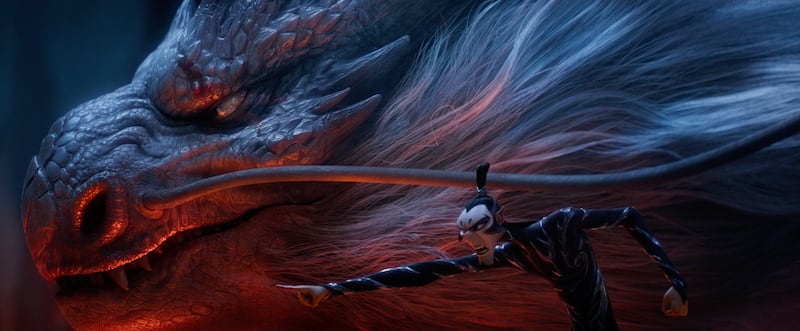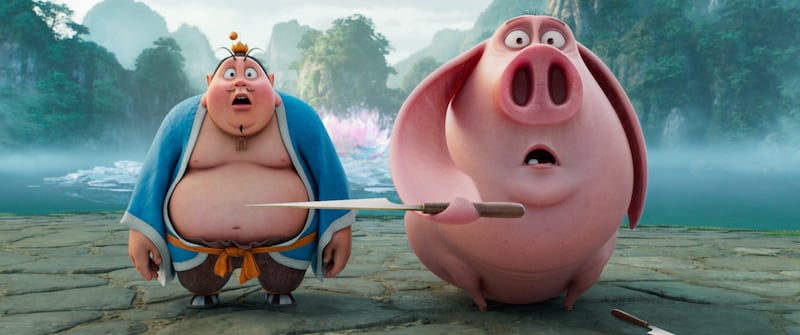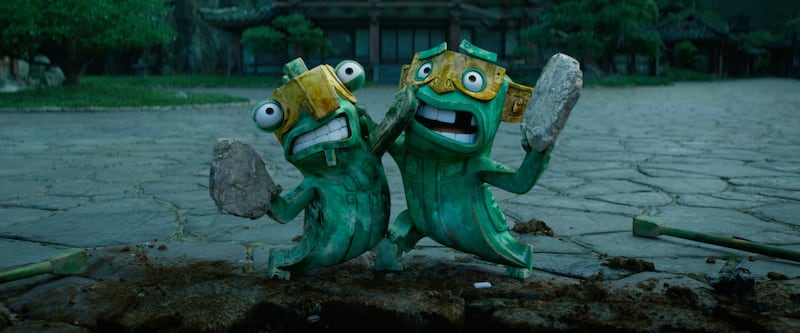Even though box-office records are largely meaningless, especially when they’re not adjusted for inflation, China’s Ne Zha 2 is an unqualified international sensation, having already amassed a $2.2 billion global haul that makes it the most successful animated film ever and the fifth-highest-grossing theatrical release in the medium’s history.
Those totals were primarily earned outside the U.S., but on Aug. 22, domestic audiences finally get to see what all the fuss is about when writer/director Jiaozi’s hit arrives in an all-new English dub. What they’ll discover is an epic action-adventure marked by striking CGI animation and spectacular set pieces. Whether they’ll be as enraptured as the rest of the world with its convoluted 144-minute story, however, remains to be seen.
Inspired by Chinese mythology and the 16th-century novel Investiture of the Gods, Ne Zha 2 opens with a hand-drawn prologue that recaps the basic events of the prior film. Still, those without any knowledge of that predecessor would do well to catch up with it before seeing Jiaozi’s sequel.
Having been destroyed by a divine lightning bolt, Ne Zha (Crystal Lee) and Ao Bing (Aleks Le)—best friends who are the reincarnations of the Demon Orb and Spirit Pearl—are now ghostly spirits. To solve this problem, Master Taiyi Zhenren (Rick Zeiff) uses a Sacred Lotus to regenerate their bodies. Yet before that process is completed, Taiyi Zhenren’s fellow immortal Shen Gongbao (Jaden Waldman) shows up with an army of monsters to wage war against them and their home of Chentang Pass.
That’s all in collaboration with dragon king Ao Huang, who wants revenge for his son Ao Bing’s (supposed) death and, also, to keep his fatherhood (which was forbidden; he stole Ao Bing) secret from the powers-that-be.

Because his corporeal form falls apart before it solidifies, Ao Bing hops inside Ne Zha’s body, thus creating a scenario in which the two vie for control of their physical vessel. This struggle mounts when, having realized his mistake, Ao Huang demands that his boy get his own body back.
To do that entails reviving the exhausted Sacred Lotus—a task achievable via a magic elixir that Ne Zha can acquire by completing three perilous trials under the guidance of immortal bigwig Wuliang (Robert Clotworthy), who resides in a misty mountain palace. Should he succeed in seven days (the maximum duration Ne Zha and Ao Bing can be conjoined), Ao Huang will withdraw his forces from Chentang Pass. In the meantime, Shen Gongbao is left to watch over the locale, much to the chagrin of Ne Zha’s parents Li Jing (Vincent Rodriguez III) and Lady Yin (Michelle Yeoh).
Jiaozi’s script moves at such a scorching pace that keeping up with it requires constant effort. Even so, once Ne Zha and Ao Bing embark on their quest, the film temporarily settles into a punchy groove, with Ne Zha popping sleeping pills so Ao Bing can take the proverbial wheel—a necessity given that they must hide Ne Zha’s fiery demon powers from Wuliang, who wouldn’t approve of blessing such a creature.
In fact, Wuliang and his demon hunters are devoted to eradicating Ne Zha’s kind, and their intolerance is one of numerous themes that are raised and then drowned out by an avalanche of sound and fury. By its conclusion, Ne Zha 2 additionally touches upon issues of identity, love, grief, faith, and loss, albeit in a cursory fashion that renders them mere embellishments for an extravaganza that needs no further ornamentation.

Ne Zha is a superpowered boy with “raccoon eyes, a pig’s nose, and a missing tooth,” and he spends most of Ne Zha 2 either raging against everyone (he’s the flipside to the calm water-powered Ao Bing) or weeping like a little kid. While he’s meant to be charmingly feral, he comes across as an annoying child with severe anger-management issues designed to get him into trouble.
There are copious quantities of that in Jiaozi’s film, since Ne Zha’s attempts to attain the elixir lead to conflict with a trio of formidable adversaries, one of whom is the father of Shen Gongbao and Shen Xiaobao (Aidyn James Ahn), who desperately wants to be like his big brother. Throw in the dragon king’s tensions with his own siblings, who covet escape from their hellish prison, and the proceedings quickly devolve into a thicket of mythological characters, relationships, customs, rituals, and magic, most of it making less sense as the action unfolds.
It’s nearly impossible to imagine young American audiences making heads or tails of Ne Zha 2, regardless of the fact that it trades in universal concerns like being yourself and staying loyal to family and friends. Jiaozi’s legendary tale is overstuffed in every regard, doling out exorbitant amounts of weepy pathos, puerile humor (pee, poop, fart, and puke jokes all appear in the first half-hour), and fearsome one-on-one skirmishes and chaotic clashes between waves of warriors, devils, and aquatic beasts.
The film’s battles are elaborately choreographed and intensely executed, and the director’s visuals are elastic, imaginative, and distinctive, even if his characters boast the rubbery skin textures of countless modern CGI features. Yet despite attractive aesthetics, its fights grow wearisome, especially as the material crosses the two-hour mark and, in the process, zooms past multiple potential endings.

Ne Zha 2 strives for grandeur not only visually but narratively, to the point that it features one major character’s death (dramatized with violent heartstring-tugging) and a massacre of innocents that subtly recalls the aftermath of Pompeii.
Jiaozi’s desire to wrestle with profound emotions is admirable, but in the confines of this showy children’s fantasy, these cataclysms feel ill-fitting. Moreover, they’re unnecessary, as demonstrated by a finale that cares far less about death, regret, and vengeance than about Dragon Ball Z-esque heroes felling titanic foes and their minions with colorful blasts of fire, ice, and energy.
On a technical level, Ne Zha 2 confirms that China’s movie industry is capable of matching the polished digital artistry of Pixar and Illumination. Unfortunately, it also suggests that the foreign market has learned the wrong lessons from Hollywood, embracing slam-bang spectacle and kitchen-sink excess over cogent, moving storytelling. Box-office bonanza or not, it’s just more of the same style over substance.
The post ‘Ne Zha 2’: The Most Successful Animated Film of All-Time Arrives in the U.S. appeared first on The Daily Beast.




